CLIMATE CRISIS
European Union warns deadly flooding, wildfires show climate breakdown fast becoming the norm
EU Crisis Management Commissioner Janez Lenarcic warned that beyond the human cost, nations are also struggling to cope with mounting bills for repairing the damage from emergencies and the lengthy recovery from disaster
AP Brussels Published 18.09.24
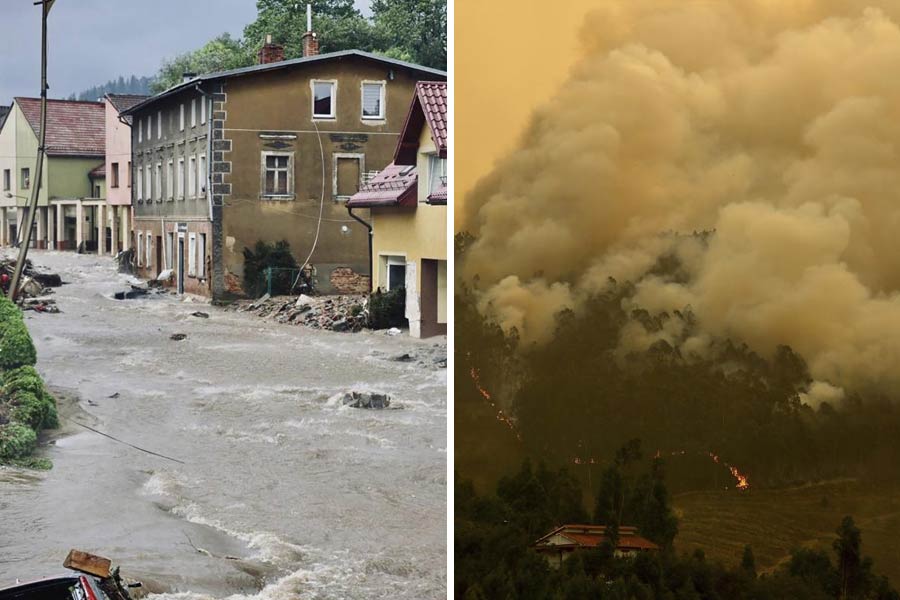
Flooded street in the town of Nysa (left), Wildfire advances near Sever do Vouga, a town in northern Portugal (right).AP/PTI
Devastating floods through much of Central Europe and deadly wildfires in Portugal are joint proof of a “climate breakdown” that will become the norm unless drastic action is taken, the European Union's head office said Wednesday.
“Make no mistake. This tragedy is not an anomaly. This is fast becoming the norm for our shared future,” said EU Crisis Management Commissioner Janez Lenarcic.
The worst flooding in years moved Tuesday across a broad swath of Central Europe, taking lives and destroying homes. At the other end of the 27-nation EU, raging fires through northern Portugal have killed at last six people.
Also Read
In pictures: Poland fortifies towns as deadly floods afflict central Europe
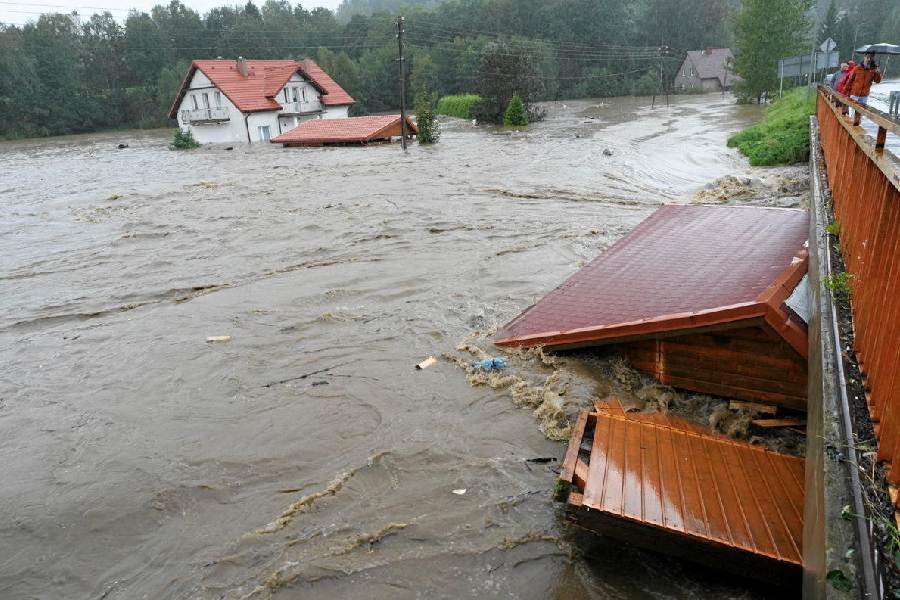
“Europe is the fastest warming continent globally and is particularly vulnerable to extreme weather events like the one we are discussing today. We could not return to a safer past,” Lenarcic told EU lawmakers in Strasbourg, France.
He warned that beyond the human cost, nations are also struggling to cope with mounting bills for repairing the damage from emergencies and the lengthy recovery from disaster.
“The average cost of disasters in the 1980s was 8 billion euros per year. More recently in 2021 and in 2022, the damage is surpassed 50 billion euros per year, meaning the cost of inaction is far greater than the cost of action,” he said.
Terry Reintke, president of the Greens group in the European Parliament, said the cost for the EU since the 1980s was estimated at 650 billion euros.
The EU is struggling to move quickly with measures to counter climate change and has run into political opposition in many member states, where the political climate is turning against environmental issues and measures ranging from home heating to farm pollution.
“Our success will depend on how determined we are to combat climate change together in order to reduce emissions,” Reintke said, adding that EU members must back its Green Deal.
The vast EU plan to become climate neutral by 2050 has come under increasing pressure from critics who call it unrealistic and too expensive. Populist and far-right parties have made it a key point of attack on the bloc's institutions.
Lenarcic said people only needed to follow the daily news to understand the urgency of the issue.
“We face a Europe that is simultaneously flooding and burning. These extreme weather events ... are now an almost annual occurrence,” he said. “The global reality of the climate breakdown has moved into the everyday lives of Europeans.”
Wednesday 18 September 2024
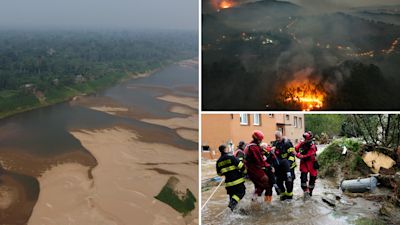
Multiple extreme weather events have unfolded across the globe in recent weeks.
Hundreds of people have died and homes and livelihoods were destroyed as catastrophic flooding, large wildfires, intense bouts of heat and drought and supercharged typhoons struck across continents, destroying homes and livelihoods.
Climate scientists have warned global warming is likely contributing to more frequent extreme weather events, with 2024 the hottest global summer on record, and rising sea temperatures driving more intense storms.
The European Union's head office said recent events on the continent, including wildfires in Portugal and devastating flooding in central and eastern Europe, is proof of a “climate breakdown” that will become the norm unless drastic action is taken.
EU Crisis Management Commissioner Janez Lenarcic said: “We face a Europe that is simultaneously flooding and burning. These extreme weather events ... are now an almost annual occurrence.
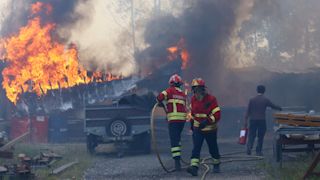
Six dead as thousands of firefighters tackle Portugal wildfires
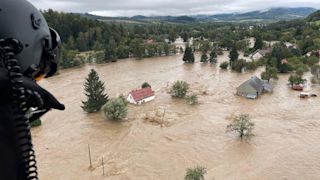
Battle to reinforce Poland and Hungary rivers after 17 dead in Europe floods
“The global reality of the climate breakdown has moved into the everyday lives of Europeans.”
Europe is the world's fastest warming continent, he added, making it "particularly vulnerable" to extreme weather
Lenarcic also warned that beyond the human cost, nations are also struggling to cope with mounting bills for repairing the damage from emergencies and the lengthy recovery from disaster.
Wildfires
Firefighters in Portugal are battling to contain some 100 wildfires that have raged across the north of the country.
Hot and dry conditions sparked the blazes, which have killed at least six people, including four firefighters. Many have been forced to flee their homes and more than 50 have been injured.
Active outbreaks of wildfires in Peru have led to the deaths of at least 15 people since July.
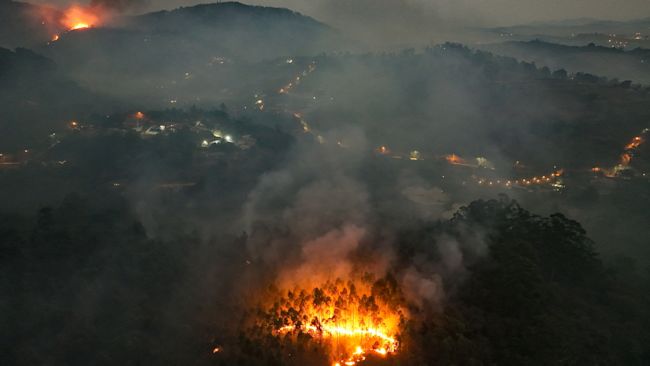
Blazes have also broken out in Brazil's Brasilia National Park. The fire was started by human activity, according to police, but weather conditions caused it to quickly spread.
Wildfires have also raged in southern California. On Sunday, more than 8,000 people battled three large outbreaks, with the largest forcing around 10,000 people to evacuate.
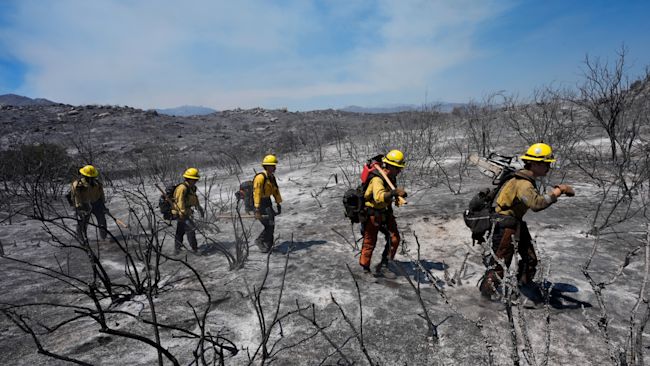
Flooding
More than 500 people have been killed in south east Asia, after Typhoon Yagi combined with seasonal monsoon rains triggered catastrophic floods and landslide.
Myanmar was particularly badly affected, with Vietnam, Thailand, Laos and the Philippines also in its path.
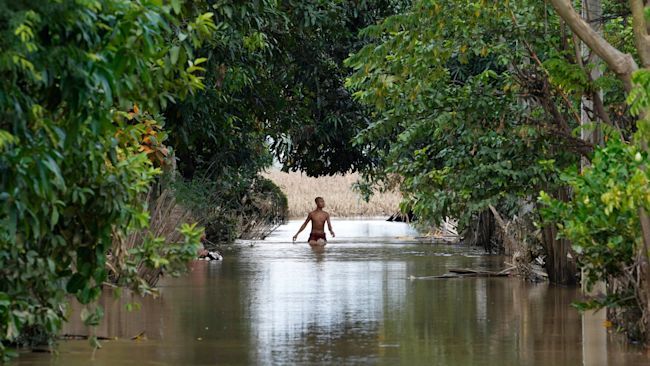
Storm Boris swept through central Europe this week brought widespread flooding which has killed at least 17 people across Poland, Romania, Austria and the Czech Republic.
In Italy, the country's National Civil Protection Service has also issued yellow alerts for nearly 50 regions tomorrow, warning there is a risk of storms, landslides and floods.
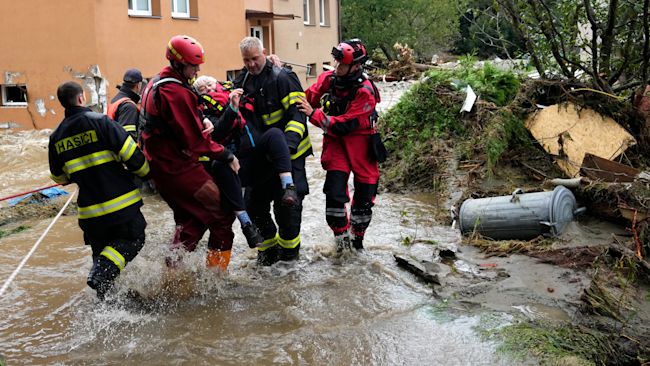
Parts of the US state of North Carolina have also been struck by flooding, with 20 inches (50cm) of rain falling in some areas.
In Nigeria, severe rains caused a major dam to collapse on September 10, killing 30 people and displacing a million
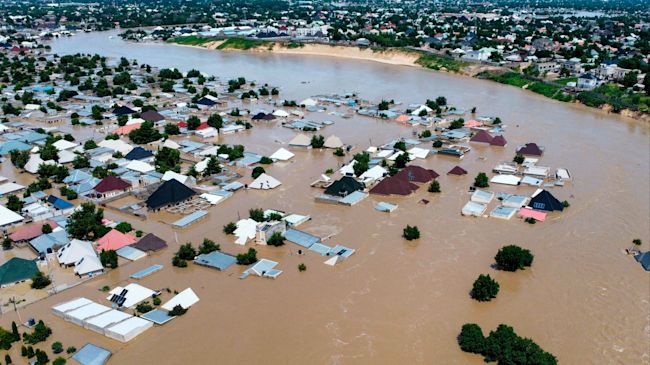
Subscribe free to our weekly newsletter for exclusive and original coverage from ITV News. Direct to your inbox every Friday morning.
Drought
As wildfires rage in Brasilia National Park, Brazil is also enduring its worst drought since records began more than seven decades ago, affecting almost 60% of the country.
Authorities said water levels of the Paraguay River fell to their lowest point in 120 years.
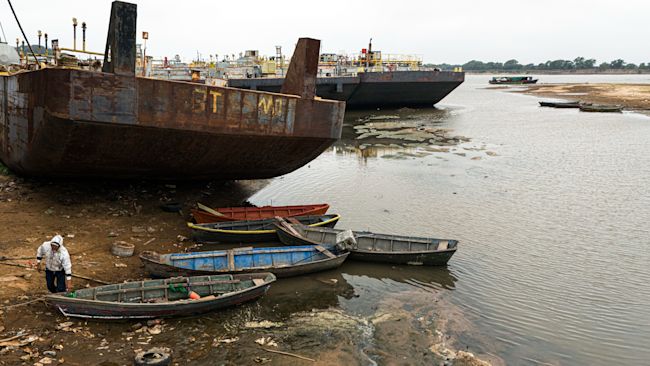
Severe drought in Zimbabwe and Namibia has prompted governments to plan to slaughter hundreds of wild animals, including elephants, to help feed those struggling to afford food.
Worst drought on record lowers Amazon rivers to all-time lows
The worst drought on record has lowered the water level of the rivers in the Amazon basin to historic lows, in some cases drying up riverbeds that were previously navigable waterways.
The Solimoes, one of the main tributaries of the mighty Amazon River whose waters originate in the Peruvian Andes, has fallen to its lowest level on record in Tabatinga, the Brazilian town on the border with Colombia.
Downriver in Tefé, a branch of the Solimoes has dried up completely, as seen by Reuters reporters who flew over the river on Sunday.
The nearby Lake Tefé, where more than 200 freshwater dolphins died in last year’s drought, has also dried up, depriving the endangered pink mammals of a favorite habitat.
“We are going through a critical year,” said Greenpeace spokesperson Romulo Batista, pointing to where the riverbed of the branch of the Solimoes had turned to mounds of sand. “This year, several months have broken last year’s records.”
The second-consecutive year of critical drought has parched much of Brazil’s vegetation and caused wildfires across South American nations, cloaking cities in clouds of smoke.
“Climate change is no longer something to worry about in the future, 10 or 20 years from now. It’s here and it’s here with much more force than we expected,” Batista added.
The Solimoes in Tabatinga was measured at 4.25 meters below average for the first half of September.
At Tefé, the river was 2.92 meters below the average level for the same two weeks last year and is expected to drop further to its lowest-ever.
In Manaus, the Amazon’s largest city, where the Solimoes joins the Rio Negro to form the Amazon River proper, the level of the Rio Negro is approaching the record low reached in October last year.
“Last year, we were in this situation by October,” said Indigenous leader Kambeba. “This year, the drought has gotten worse.”
(Reuters)
Storm Boris hits Romania’s ailing villages, but misses its economy
Thousands of homes — estimates range between 5,000 and 6,500 — have been filled with mud in several villages in eastern Romania, following severe floods in recent days. Approximately 20,000 homes were impacted by Storm Boris, which has ravaged Central Europe and dominated headlines for days.
However, from a macroeconomic perspective, Storm Boris did not significantly impact Romania's key economic hubs or its core working population, which are concentrated in urban areas and tend to shape public opinion and media coverage.
That doesn’t diminish the humanitarian crisis faced by those relying on public support, particularly as they are the weakest segment of the country’s population. Several hundred people in Romania now rely on public support in the camps organised by the government.
Still, the floods quickly faded from the headlines in Romania. A large part of the population in the area hit by the storm was either working abroad, or in their apartments in the cities when Storm Boris arrived at their countryside homes. The flooding thus hit the weakest people — those who remained in the villages — and most of them still managed to get support from their families in urban areas.
Unlike Budapest, Vienna, Bratislava or Prague, Bucharest and the other large Romanian cities that account for most of the country’s GDP are not on major rivers.
The flow on the Danube is controlled by two dams, so the most exposed populated areas are small villages on rivers insufficiently touched by the communist regime’s river regulation campaign. A river regularisation project abandoned on the fall of communism in 1989 could have prevented the flooding of several villages over the weekend, according to experts.
Estimating the damage is challenging, as very few of the damaged houses were insured under the mandatory scheme, and perhaps none under voluntary schemes. Much of the damaged infrastructure was already in poor condition. There were no factories, large farms or modern retail establishments in the affected areas. Banks rarely even have ATMs in villages like those hit by the floods. Even the betting shops found on almost every street in Romania are banned by law from villages with a population under a certain threshold.
The executive quickly decided to pay out €20mn from the reserve fund, or €2,000 per damaged house, and jumped at the opportunity to demonstrate its commitment to support the affected population ahead of the parliamentary elections this year.
While firefighters were still rescuing people in the flooded areas, the president of the junior ruling National Liberal Party (PNL) Nicolae Ciuca was launching his presidential candidacy.
Meanwhile, Social Democrat leader and Prime Minister Marcel Ciolacu was celebrating the appointment of Romania’s nominee in the European Commission. Ironically, Roxana Minzatu was appointed as commissioner for social policies, an area where Romania lags behind as demonstrated by the widest income discrepancy in the entire European Union.
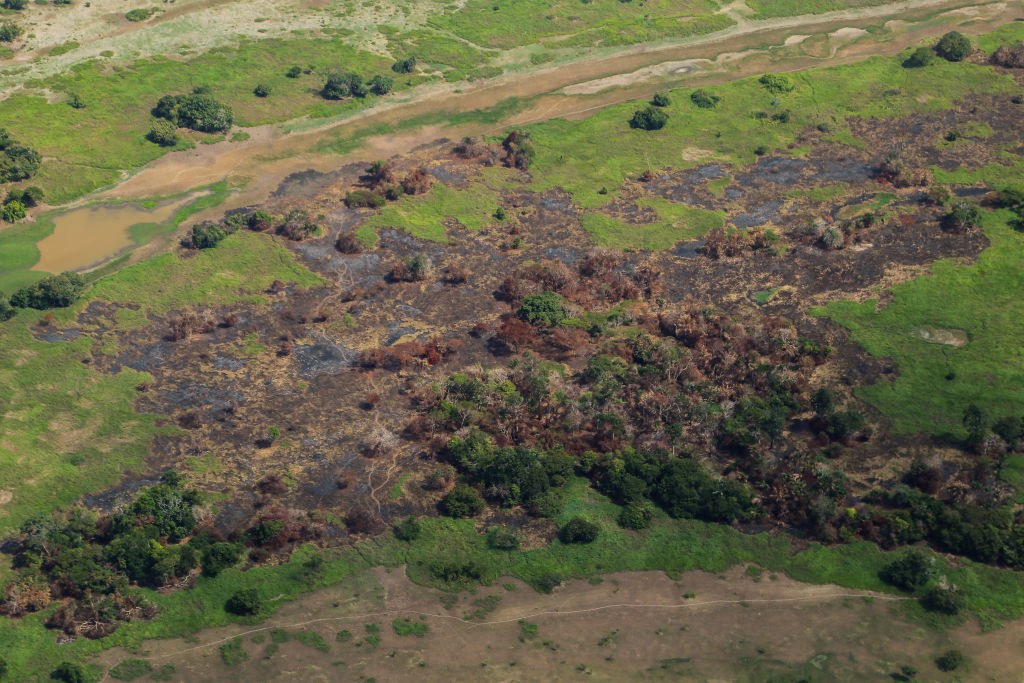

No comments:
Post a Comment